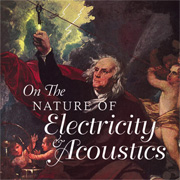Compilations live or die on the strength of just a few key factors. The initial idea – that which is to be compiled – must be strong and coherent without being repetitive. The curatorial spirit is important because not everything can be included, and how it’s all presented is key to the impact the release can have. The material itself obviously has to be worthwhile. Taking on the task of collecting the best of the "electro-acoustic music" produced in Ireland in the last the last 40 years or so, On The Nature Of Electricity & Acoustics has given itself a very wide brief. Given that finding some sort of cohesive idea of what defines electro-acoustic music would be difficult enough, a representative collection was always going to be a tough remit for curator and contributor Daniel Figgis to fulfill. Spanning 23 tracks in little over an hour, the aim here appears to be at once succinct and sprawling.
The collection opens with ‘Baby Grand’ by Roger Doyle, in many ways the founding father of Irish electro-acoustic music. Originally released in 1978 as part of his Six Pieces For Pupils Who Don’t Like Exams, the piece hints at the direction that Doyle’s work would later take, blending discrete patterns of dry, synthesised piano with swelling reverb that emerges from phrases to briefly smother the sound. The approach is more tonal than melodic, a key distinction from the more straightforward compositions he had been working on before, using blocks of sound rather than blocks of notes, as it were. It’s a suitable starting point.
What follows is perhaps more scattered than it really needs to be. Educution’s ‘Again With The Hose’ jumps forward to 2012, though the soundworld is not drastically different to Doyle’s piece. At a brief 100 seconds, it feels more like a snippet than an impressive track in its own right. This is a problem that rears its head over and over again, where there simply isn’t time for each track to leave a mark on the listener, with their brevity failing to offer more than a cursory glance at what a given composer is doing. Educution is more known for his techno work, releasing on the sadly-dormant D1 Recordings and getting played out by the likes of Ben Simms and Kevin Saunderson. The liner notes mention all this, though the tiny piece of his music presented never hints towards that side of his work.
While there is no inherent need for compilations to be stylistically consistent to be successful, the wide range of music presented here is bound to test listener patience. Deep Burial’s ‘GlueBagLung’ from 2005 flirts with glitchy hip-hop in the vein of early Anticon material or a darker Prefuse 73, while Ian Wilson’s ‘Devotional 3’ follows it directly with a sparse, mournful string arrangement. Donnacha Dennehy’s beautiful and haunting ‘Misterman’ is followed by the bleating toy-keyboard tones of Pat Day’s ‘Com-plex’. With juxtapositions such as these, it’s hard to tell whether the compilation’s aim is to present a coherent whole or highlight the lack of one.
The aforementioned ‘Misterman’ comes in the middle of a particularly strong section, beginning with Spectac’s ‘Centurian’ and Linda Buckley’s ‘Error Messages’, two composers from different backgrounds – one electronica, one classical – whose tracks here display the same affinity for high frequency manipulation, electronic ticks and unexpected harmonic movements. Dennehy’s piece continues this, opening it out into a droning work of epic scope and execution. For anyone familiar with his work as part of the Crash Ensemble, the elegiac tone will come as no surprise. With its ghostly voices and heavy, enveloping tones, ‘Misterman’ is not a world away from the emotional gut-punch of Burial, albeit coming from a different place entirely, more Arvo Part than ‘Archangel’.
Enda Bates, who has worked with Dennehy and the Crash Ensemble, makes an appearance with an excerpt from ‘Liminality’, a track from 2006 that echoes the kind of distorted power that Tim Hecker has since made his own. Again it feels too short, at just three minutes, but it certainly makes the most of it’s brief, impressive appearance. The nine-track stretch from here to the finish line feels long, perhaps because of the musical expanse already covered through the first 14 tracks. The highlight of this final third is undoubtedly Cathal Coughlan’s ‘Second City Bicycle Bounce’ a track that just refuses to get pinned down by genre or tone, with the former Microdisney and Fatima Mansions man setting up one-finger melodies against an ever-changing backdrop of rhythmic jackhammer samples and gloriously uplifting synth chords.
Ultimately, by virtue of sheer disparity, there’s a good chance that one will find something to like among the tracks on show. From the delicate works of Dennehy and Wilson through to the post-punk furore of Figgis’ own Princess Tinymeat, there is presumably something for everyone. Because the initial brief is so wide and undefined, it feels hard to criticise any given track for being out of place, even though examples like Princess Tinymeat and Trevor Knight share little – in terms of aesthetics at least – with the rest of the work. The expanded iTunes-only edition of 35 tracks can only emphasise both the positive and negative aspects of the compilation – offering a wide-ranging and intelligent overview of outsider electronic music in Ireland, but not going into depth on any element of it in particular. As an introduction to the work of a diverse group of artists and composers, On The Nature Of Electricity & Acoustics is unparalleled, but it is far from perfect as a listening experience. You’re left with a lot of work to do and a lot of leads to chase up – but maybe that’s not such a bad thing.



